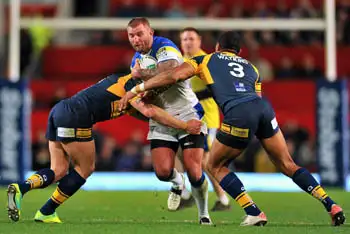Bad start for new dual-registration system

The dual-registration system is quickly becoming a source of discontent among fans, and something needs to be done to change the way it works.
With the changes made to the structure under first-team level, over the close season a number of Super League clubs announced link-ups with Championship counterparts.
Last weekend, ahead of the first game of the new season, it was announced that seasoned Warrington prop Paul Wood, who just months earlier played in the Super League Grand Final, was to play for Swinton.
The Lions originally named nine players in their 19-man squad with connections to Wolves, only to later reveal that they had actually permanently signed several of them, which had apparently slipped under the radar and which bizarrely, they hadn’t decided to announce – you would have thought the capture of some highly promising youngsters from a top Super League team would be an ideal PR opportunity. Or perhaps there’s more to it.
This week, we have two further experienced forwards in Leeds pair Kylie Leuluai and Richard Moore dual-registered with Hunslet.
It now seems to be that clubs are abusing the dual-registration system to help get their players back to fitness, when it was supposed to be all about giving young players the opportunity, players that perhaps haven’t quite made it by the age of 19, meaning that they would avoid being cast off when they reach that age.
Spare a thought too for clubs with ambitions of their own. While Leigh haven’t been shy in using the old format of dual-registration in recent years, they now face the prospect of facing Hunslet with two Super League quality props in their pack, when in future weeks, their rivals like Featherstone and Halifax may face the Hawks’ usual front-row.
The Grand Final winning half-back at Sheffield last season, Simon Brown, penned a surprise move to York, who finished bottom of the Championship in 2012.
Perhaps the extra funds for Brown stemmed from the knowledge that York could at least draft in a few extra players from their partner club, Hull, rather than have to use money on adding a few more of their own players to their 25-man squad.
That may be the cynical view, but there are some top end Championship coaches who are getting increasingly frustrated that, having built their own teams up over a couple of seasons in the right manner, they are now under threat by clubs who see their squads artificially improved by the addition of Super League first teamers at any given point.
Having a Paul Wood or a Kylie Leuluai for a few weeks, offers no long-term benefit for the receiving club. They are essentially being used as puppets in a glorified feeder system.
You can hardly criticise the academy structure at Leeds, which is world class and has been for several years. They have created a dynasty courtesy of their Super League titles, won by and large by homegrown teams. But there are now increasing questions as to whether the top clubs are abusing what was supposed to be a progressive system to their benefit.
The previous system of dual-registration meant that specific players were made available to other clubs, whereas it’s now more flexible in that the players selected can be changed week in week out.
Perhaps a solution might be to limit the maximum age of players who can be sent out on dual-registration, to stop clubs sending out players for match fitness. The only problem with that, is that there is currently no way that the top clubs can return their players to match fitness, due to changes in eligibility below the first team.
What’s becoming increasingly clear as the weeks pass, and we’re only one and a half weeks in to the season, is that the current set-up is open to abuse. There is justification behind most, if not all, of the partnerships, but there may need to be tweaks to how it operates before the integrity of the Championship is adversely affected.